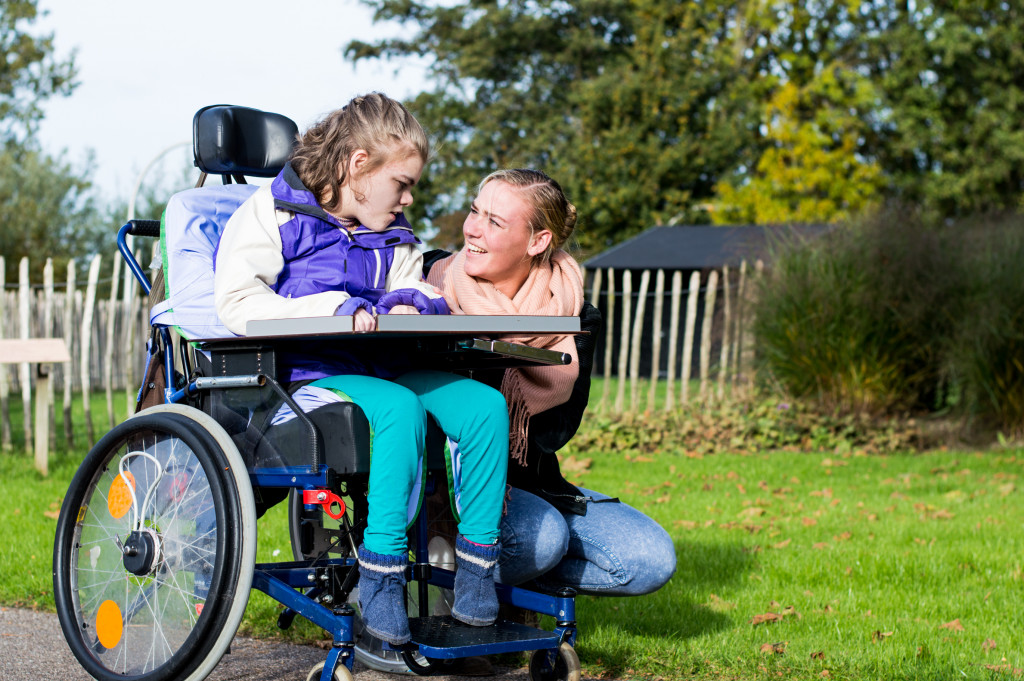- Emphasize a healthy, diverse diet that incorporates fruits, vegetables, grains, proteins, and healthy fats.
- Advocate for physical activity that suits your child’s abilities and encourages active engagement.
- Maintain a consistent healthcare routine, including regular appointments and proper medication adherence.
- Address mental and emotional health needs, creating a supportive environment and seeking appropriate treatments.
- Utilize available support services in your area, including financial, educational, and medical assistance programs.
Having a child with a disability can present various challenges for parents. As a parent, it is essential to provide your child with the best possible care, especially when it comes to their health and wellness.
Taking care of a child with a disability requires a lot of attention, patience, and effort to ensure that they live as healthy and comfortable lives as possible. This blog will discuss tips for optimizing health and wellness for children with disabilities, specifically for parents.
Encourage a healthy and diverse diet.
A healthy and diverse diet is crucial to optimize your child’s health and wellness. As a parent, it is essential to encourage your child to consume a range of whole foods to ensure that they are receiving the necessary nutrients to help with their growth and development. Such foods include the following four:
Fruits and vegetables.
Fresh fruits and vegetables provide a great source of essential vitamins and minerals. Make sure to include both in your child’s diet. You can offer them in easy-to-eat pieces, such as slices of apple or carrots.
Whole grains.
Grains are important sources of energy, fiber, and various nutrients. Aim to offer your child whole grain bread, pasta, cereals, etc. Whole grains are also rich in complex carbohydrates, which help to fuel the body and encourage a healthy metabolism.
Healthy proteins.
Protein is essential for proper growth and development. Choose lean meats, fish, eggs, nuts, and dairy products. You can also try plant-based proteins such as lentils, beans, and quinoa.
Healthy fats.

Healthy fats are essential for optimal brain function and overall health. Foods like avocado, olive oil, nuts, and seeds all provide healthy sources of fat that you should include in your child’s diet.
Working with a nutritionist or dietician regarding your child’s unique dietary requirements can also be useful in creating an optimal diet plan.
Advocate for physical activity.
Children with disabilities often face limitations and challenges in being physically active. As a parent, it is essential to advocate for and encourage physical activity as much as possible. Encourage your child to participate in adaptive sports or activities that cater to their abilities. Always converse with their healthcare provider to determine the most suitable forms of physical activity and ensure that your child is safe and comfortable in their activities.
Consistency with healthcare appointments and medication.
It is crucial to establish a consistent healthcare routine for your child, consisting of frequent visits to their doctors, therapists, and specialists when necessary. Consistent scheduling of appointments and adherence to prescribed medication regimes is essential to ensure that your child is always receiving the best possible care and monitoring their health and wellness regularly. Work with your healthcare providers to establish a routine that works best for your family.
Work on mental and emotional care.
Children with disabilities can face additional emotional and mental health obstacles, such as anxiety, depression, or social challenges. As a parent, it is essential to be attentive to your child’s mental and emotional needs and to work on building a positive and supportive environment. Consider enrolling your child in therapy and work with their healthcare provider to discuss other forms of treatment that may be appropriate to support their mental and emotional care.
Taking advantage of available support services.

Taking advantage of the various support services available to families with children with disabilities can be incredibly beneficial. Many organizations and associations offer financial, educational, medical, social, or recreational aid for individuals with disabilities and their families. Research your local area to get in touch with any available support services or assistance programs that would be beneficial for you and your family.
For example, if you’re based in Australia, the National Disability Insurance Scheme (NDIS) provides funding to assist people with disabilities in achieving their goals and objectives, as well as providing access to various services and support networks. You can also hire NDIS-registered plan managers to help manage your child’s funding and coordinate their support. These plan managers can help ensure that you are taking full advantage of the funding and support available to your family.
Caring for a child with a disability comes with unique challenges, but with the right strategies and support, parents can ensure their child leads a healthy and fulfilled life. Remember that each child is unique, and the approach to their care should be tailored to their individual needs. As a parent, your love, patience, and dedication make all the difference.
